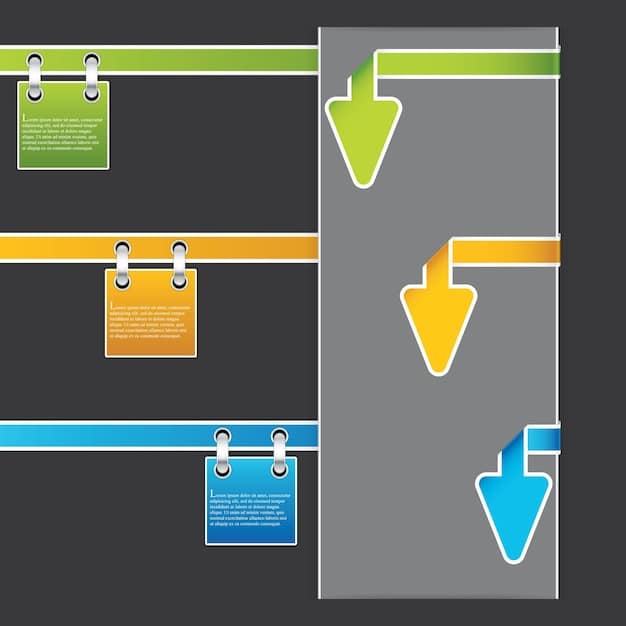Is a Roth IRA Conversion Right for You? A Financial Planning Analysis for 2025

Determining if a Roth IRA conversion is right for you in 2025 involves assessing your current and future tax bracket, understanding the potential for tax-free growth, and considering your long-term financial goals.
Considering a change in your retirement strategy? Let’s explore whether a Roth IRA Conversion Right for You? A Financial Planning Analysis for 2025 might be the right choice for your financial future.
Understanding Roth IRA Conversions
A Roth IRA conversion involves transferring funds from a traditional IRA to a Roth IRA. This seemingly simple move has profound implications for your tax liability and retirement savings. Let’s dive into the mechanics and benefits of this strategy.
When you convert to a Roth IRA, you pay income tax on the amount converted in the year of the conversion. The trade-off is that future withdrawals, including earnings, are tax-free, provided certain conditions are met. This aspect can be particularly attractive if you anticipate being in a higher tax bracket in retirement.
Key Considerations
Before deciding if a Roth IRA conversion is right for you, consider the following factors:
- Current Tax Bracket: Are you currently in a low tax bracket? If so, converting may be more advantageous.
- Future Tax Bracket: Do you anticipate being in a higher tax bracket in retirement? A Roth IRA could shield your earnings from future taxes.
- Investment Timeline: How long do you have until retirement? The longer your investment horizon, the more time your investments have to potentially grow tax-free.
Roth IRA conversions are not one-size-fits-all. A thoughtful analysis of your financial circumstances is crucial before making this decision.
Benefits of Converting to a Roth IRA
Converting to a Roth IRA offers several potential benefits. These advantages span from tax savings to estate planning, making it a compelling option for many eligible individuals. Let’s explore these in more detail.
One of the most significant benefits is the potential for tax-free growth and withdrawals during retirement. Unlike traditional IRAs where withdrawals are taxed as ordinary income, qualified distributions from a Roth IRA are entirely tax-free. Another advantage is that Roth IRAs are not subject to required minimum distributions (RMDs) during the account owner’s lifetime.

Tax-Free Growth
The most appealing aspect of a Roth IRA is the potential for tax-free growth. Earnings in a Roth IRA grow tax-deferred, and withdrawals in retirement are tax-free, provided certain conditions are met. This benefit can significantly enhance your retirement savings.
Estate Planning
Roth IRAs can be a powerful tool in estate planning. Since there are no required minimum distributions (RMDs) during the original owner’s lifetime, assets can continue to grow tax-free and potentially be passed on to beneficiaries. Beneficiaries may also receive distributions tax-free, depending on the regulations at the time.
In summary, the benefits of converting to a Roth IRA range from tax advantages during retirement to strategic estate planning opportunities. However, evaluating whether it aligns with your unique financial situation remains key.
Potential Drawbacks of a Roth IRA Conversion
While Roth IRA conversions offer numerous benefits, it’s equally important to acknowledge potential drawbacks. Understanding these challenges can help you make a well-informed decision regarding your retirement savings strategy.
The immediate tax liability is a primary concern. When converting to a Roth IRA, you must pay income tax on the converted amount in the year of the conversion. This could result in a substantial tax bill. It’s also important to note that once a conversion is made, it’s generally irreversible. Recharacterization, which allowed converting back to a traditional IRA, is no longer permitted except in very specific circumstances.
- Immediate Tax Liability: Paying income tax on the converted amount can significantly impact your current financial situation.
- Irreversibility: Once the conversion is complete, you cannot undo it unless specific conditions apply.
- Potential for Regret: If your tax bracket in retirement turns out to be lower than your current bracket, you may regret paying the conversion taxes.

Understanding these potential drawbacks is key to making an informed decision about whether a Roth IRA conversion aligns with your financial goals and risk tolerance.
Assessing Your Financial Situation for a Roth IRA Conversion
Before converting to a Roth IRA, a prudent assessment of your financial situation is essential. This involves evaluating your current income, future income projections, and retirement goals. Let’s delve into the critical aspects of this evaluation.
Start by determining your current tax bracket and estimating your future tax bracket in retirement. Factor in your current and future expenses, as this can impact the viability of paying current conversion taxes. Also, consider your investment timeline. The longer you have until retirement, the more time your investments have to grow tax-free in a Roth IRA.
Questions to Ask Yourself
Consider these questions when evaluating your financial situation:
- What is my current tax bracket?
- What do I anticipate my tax bracket to be in retirement?
- How long do I have until retirement?
Answering these questions honestly and thoroughly can guide you toward a more informed decision about whether a Roth IRA conversion is right for you.
Strategies for Managing the Tax Implications
Managing the tax implications of a Roth IRA conversion is crucial to maximizing the benefits and minimizing financial strain. Careful planning and smart strategies can help you navigate this process effectively. Let’s look at some approaches.
One effective strategy is to convert smaller amounts over multiple years. This can help you avoid pushing yourself into a higher tax bracket in any one year. Paying the conversion taxes from funds outside of your retirement accounts ensures that you’re truly converting the full potential amount. Also, consider consulting with a tax professional to explore potential deductions or credits that could offset the conversion taxes.
Conversion Timing
Timing your Roth IRA conversion strategically can minimize your tax burden. Consider converting during years when your income is lower than usual, such as during a career transition or sabbatical.
Tax-Efficient Investments
Consider moving more tax-efficient investments, such as stocks, into your Roth IRA to capitalize on tax-free growth. Meanwhile, leave less tax-efficient assets in your traditional IRA to minimize the impact of required minimum distributions.
Effectively managing the tax implications of a Roth IRA conversion can optimize your financial outcomes. Thoughtful strategies such as phased conversions, using outside funds, and consulting with experts can facilitate a smoother process.
Roth IRA Conversions: Planning for 2025
As you plan for 2025, understanding the evolving financial landscape and potential tax law changes is essential for making informed decisions about Roth IRA conversions. Let’s explore some forward-looking considerations.
Stay informed about potential changes in tax laws that could impact the benefits of Roth IRA conversions. Monitor economic forecasts and trends, as these can influence your future tax bracket and investment returns. Review and adjust your financial plan regularly to ensure it aligns with your evolving financial goals and circumstances.
- Stay Informed: Keep abreast of any potential changes in tax laws or regulations.
- Monitor Economic Trends: Pay attention to economic forecasts that could impact your investment returns.
- Regularly Review Your Plan: Adjust your strategy as needed to ensure it aligns with your goals.
Planning for Roth IRA conversions requires a proactive stance. Staying informed, monitoring economic trends, and regularly reviewing your plan can help you make timely and beneficial financial choices.
| Key Point | Brief Description |
|---|---|
| 💰 Tax-Free Growth | Future withdrawals are tax-free in retirement. |
| 📈 Higher Tax Bracket? | Consider converting if you expect a higher tax bracket in retirement. |
| 🗓️ Conversion Timing | Convert smaller amounts over several years to avoid higher tax brackets. |
| 💼 Estate Planning | Roth IRAs can be beneficial for estate planning with potential tax-free transfers to beneficiaries. |
Frequently Asked Questions (FAQ)
▼
A Roth IRA conversion is the process of transferring funds from a traditional IRA to a Roth IRA. You’ll pay income tax on the converted amount, but future withdrawals are tax-free.
▼
Roth IRAs offer tax-free growth, tax-free withdrawals in retirement, and no required minimum distributions during the account owner’s lifetime, making them great for long-term savings.
▼
The main risk is the immediate tax liability on the converted amount. It’s also generally irreversible and may not be the best option if you expect a lower tax bracket in retirement.
▼
Assess your current and future tax brackets, investment timeline, and retirement goals. Consult a financial advisor to determine if a conversion aligns with your financial situation.
▼
Generally, Roth IRA conversions are irreversible. While recharacterization used to be an option, it is no longer permitted except in very specific circumstances. Consider all factors beforehand.
Conclusion
Deciding whether a Roth IRA Conversion Right for You? A Financial Planning Analysis for 2025 is a significant financial decision that requires careful consideration. By understanding the benefits, potential drawbacks, and tax implications, and by closely analyzing your personal financial situation, you can make an informed choice that aligns with your long-term financial goals.





